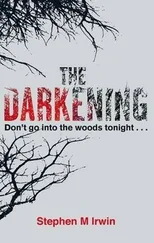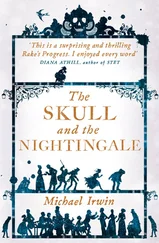Stephen Irwin - The Darkening
Здесь есть возможность читать онлайн «Stephen Irwin - The Darkening» весь текст электронной книги совершенно бесплатно (целиком полную версию без сокращений). В некоторых случаях можно слушать аудио, скачать через торрент в формате fb2 и присутствует краткое содержание. Жанр: Триллер, на английском языке. Описание произведения, (предисловие) а так же отзывы посетителей доступны на портале библиотеки ЛибКат.
- Название:The Darkening
- Автор:
- Жанр:
- Год:неизвестен
- ISBN:нет данных
- Рейтинг книги:5 / 5. Голосов: 1
-
Избранное:Добавить в избранное
- Отзывы:
-
Ваша оценка:
- 100
- 1
- 2
- 3
- 4
- 5
The Darkening: краткое содержание, описание и аннотация
Предлагаем к чтению аннотацию, описание, краткое содержание или предисловие (зависит от того, что написал сам автор книги «The Darkening»). Если вы не нашли необходимую информацию о книге — напишите в комментариях, мы постараемся отыскать её.
The Darkening — читать онлайн бесплатно полную книгу (весь текст) целиком
Ниже представлен текст книги, разбитый по страницам. Система сохранения места последней прочитанной страницы, позволяет с удобством читать онлайн бесплатно книгу «The Darkening», без необходимости каждый раз заново искать на чём Вы остановились. Поставьте закладку, и сможете в любой момент перейти на страницу, на которой закончили чтение.
Интервал:
Закладка:
He was emptying the letterbox when a man stepped through him. Nicholas jumped, his heart suddenly kicked into a sprint.
Gavin Boye kept walking up to the front porch of the house, silently carrying his gun in a black, glossy garbage bag. He stopped, then knocked silently on the door. No one answered.
Nicholas felt a greasy knot in the pit of his stomach. This was too much like the dead boy with his screwdriver outside his flat in Ealing. And that memory led back to Cate’s death.
I can’t face this every day.
He dropped the mail back in the letterbox and stepped out onto the footpath, closing the gate behind him.
It was just after lunch when a balding, constantly smiling real estate agent handed Nicholas keys to a furnished flat on Bymar Street. Nicholas had signed the lease, payed two months rent in advance, and been allowed to use the agency’s telephone to connect power and gas.
He carried the keys and his bag of herbal tea up the concrete stairs to the first-floor flat, unlocked the door and stepped inside. The furniture was cheap and badly worn. The fridge had an asthmatic rattle. The carpet smelled faintly of cannabis and wet dog. The white curtains of the front room hung as listless as dressed game fowl. He pulled one aside, repulsed by the greasy feel of the fabric, and looked down the street.
At the end of Bymar Street was Carmichael Road, and beyond it, the heavy darkness of the woods.
In the sagging kitchen, Nicholas found a ceramic kettle with a wire element, and boiled water. How could the woods still be there? How did they survive the housing boom of the fifties, the licentious building rackets of the seventies, the fiscal orgy of the ’03 spike?
It wasn’t a loved park. No one went in there. In fact, people hurried past them. People knew , without even entering, that they weren’t friendly woods.
Leave here , he thought. Buy a ticket south. Get a job in a design firm in a nice new building and live in a new apartment where there are no ghosts. You can live with that. This place hasn’t changed.
No. Not yet. First, he would go to Gavin Boye’s funeral. He would see Gavin’s widow, and Mrs Boye.
Why?
Because it’s the right thing to do.
Bullshit.
Well, then: to see.
To see what?
He chewed listlessly, staring, but the woods were a sea of shadow.
He didn’t know. Perhaps. . to look for more signs.
You’re getting plenty of signs. Signs telling you that you shouldn’t have come home. Just leave.
He could feel the weight of the woods, huge and drawing as the moon to the tides. Down there, in the green, secret velvet, the Thomas boy was being dragged between dark trees, his face a mask of terror, his last hours or minutes playing over and over, again and again.
You can bring no solace to the dead , he told himself . Why not let the departed stay departed?
Because I’m the only one who knows. .
I’ll leave after the funeral , he bargained.
He made the herbal tea. It was surprisingly pleasant. He drank it all, folded himself onto the thin fabric of the sofa, and fell into a dark and empty sleep.
10
To Nicholas, the sky seemed the same sea grey as the wet slate of the steeply set shingles on the church roof, so it was hard to see where the holy building ended and the heavens began. The rain darkened the rough stone of the church’s buttresses, and the gloom made the green moss on the lowest course of its walls almost black. A fine day for a suicide’s funeral.
He stood under a dark umbrella, listening to the rain strike a slack tattoo above his head as he watched mourners hurry inside like scolded black swans. The hearse — a long, modified Ford — was parked out front, its driver sitting upright and trying not to let passers-by see that he was reading a paperback.
He was among a small grove of she-oaks, waiting for the last of the crowd to enter the church. He smoothed back his hair with one hand, and surreptitiously sniffed at his armpit. Not too bad, considering. His sleep on the sofa had been as long as it was deep. His eyelids had drifted open just an hour ago; he’d been out nearly twenty hours. All traces of his feverish flu had gone. He’d jumped in the shower, but there was no soap. He patted himself dry with the few paper towels the previous tenant had left, pulled on yesterday’s clothes, ran his fingers over his teeth and left for the church. Standing under his umbrella, he suspected that he looked exactly like the kind of rumpled weirdo one expects to see at the fringes of a funeral. The thought was depressing.
A final car pulled up and some elderly mourners slowly alighted. Nicholas turned his gaze to the church’s damp granite flanks. From here, he could just read the lead lettering of the church’s cornerstone. It stated that the Bishop of the Western Diocese had laid this stone to the Glory of God in 1888, the funds donated by an E. Bretherton. Stained-glass windows, narrow and high and lit from within, were the blues and greens of deep-sea gems. Nicholas realised he’d never once set foot inside; his childhood church, two miles away, had been built in the 1960s of sharp, pale bricks and desperate angles determined to pierce heaven whether God wanted them or not. In contrast, this church looked as old as time.
He didn’t want to go inside. The last time he had stepped into a church was for Cate’s funeral, and every moment of that turgid service had felt an affront. The praise of God. The mercy of God. The enduring love of God. Even before the first reading, Nicholas had wanted to stand up and shout: ‘God doesn’t care! Go home! Go home and love each other while you have each other, before God snatches your loved ones away and snaps them on a bath like an unwanted pencil!’ But for the sake of propriety he’d kept his silence and listened to the droning platitudes and tried not to think that his wife’s cold body was in that garlanded, polished wood box at the front.
The rain grew heavier, tapping hard on his umbrella. The wet footpaths were empty. There were no more mourners arriving. He had no more reason to linger out here like a cowardly thief outside a petrol station.
He went inside.
Through the inner swing doors, he could see the casket wreathed in flowers on the front dais. Sprays of white lilies either side of the pulpit were as shocking as ice fountains.
The elderly minister, Reverend Hird, a small bulldog of a man in his late seventies, stood hunched at the side of the nave in discussion with a middle-aged mourner. A younger minister, a man of perhaps thirty with coffee-coloured skin, stood patiently behind his superior.
Nicholas shook off his umbrella, signed the book, and slipped quietly into the church proper.
He had hoped to sit unnoticed in the back pews, but there were only two dozen mourners so to isolate himself in the back would draw even more attention. He joined the fourth row. As he sat, several heads turned to see who was arriving this late and whether they recognised him. Most didn’t, and returned their gazes to their orders of service, their neighbours or the festooned casket. But three women kept their eyes on him. Katharine and Suzette were frowning. Katharine shook her head and returned to chatting to the elderly lady next to her; Suzette’s lips were as tight as a razor slash, and she mouthed, ‘Where the fuck have you been?’ Nicholas waved cheerfully and mouthed back, ‘Later.’ Suzette sent him one last furious glare, then turned back to the pulpit. The third woman held her stare at Nicholas longer, puzzled, trying to place him. At other times or in other lights, she would be striking, but the gloom of the church, the ubiquitous black, her shadowing half-veil made her seem carved severely from some cold and unyielding stone. He guessed this was Gavin’s widow. Her eyes narrowed, unhappy that she hadn’t identified this latecomer, and she turned her long neck again to the front. Beside her was a hooked old woman with a shock of white hair, visible under her small black hat.
Читать дальшеИнтервал:
Закладка:
Похожие книги на «The Darkening»
Представляем Вашему вниманию похожие книги на «The Darkening» списком для выбора. Мы отобрали схожую по названию и смыслу литературу в надежде предоставить читателям больше вариантов отыскать новые, интересные, ещё непрочитанные произведения.
Обсуждение, отзывы о книге «The Darkening» и просто собственные мнения читателей. Оставьте ваши комментарии, напишите, что Вы думаете о произведении, его смысле или главных героях. Укажите что конкретно понравилось, а что нет, и почему Вы так считаете.











